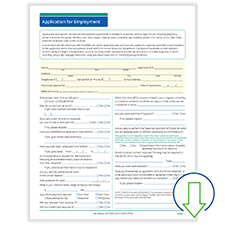
When employee performance slips or policy violations occur, especially with remote workers where oversight might be different, navigating the appropriate response can be tricky. Resisting the urge to "fire on the spot" is crucial. In most cases, you want to use progressive discipline. This involves counseling the employee first, then following up with written warnings if the problem persists. This systematic approach gives the employee a chance to improve while also protecting your business from a potential lawsuit.
Here's a closer look at 11 scenarios you may encounter in your business, and how to handle them legally and fairly:
1-Threats of Violence
Fire on the spot? Yes
When disgruntled employees take out their anger at work, the consequences can be dire. That’s why verbal threats, stalking or outright acts of violence are grounds for immediate termination. Depending on the situation, you may need to involve another person as a witness to the firing — or even call the police if the behavior has escalated.
2-Neglecting to Follow Safety Measures
Fire on the Spot? Yes
You’re responsible for providing a safe workplace. Assuming you’re complying with the safety standards that apply to your business and industry — and have trained employees on the proper precautions — you can and should immediately terminate an employee who blatantly ignores these safety measures.
3-Profanity Toward a Coworker or Customer
Fire on the spot? Yes
Vulgar outbursts against a colleague or customer should never be ignored. Religious, racial, ethnic and gender-based slurs are especially problematic because they can quickly veer into harassment. An employee who swears too much may need counseling, but one who hurls profanities or slurs in a heated argument should be shown the door.
Progressive discipline is the foundation for fair and legal firings. It puts the employee on notice of the problem, as well as the consequences for not correcting it.
4-Frequent Absences
Fire on the Spot? No
Excessive absenteeism should be addressed, especially when you’re dealing with employees who are always late or frequently call out sick. But be careful. Some absences are protected under the Family and Medical Leave Act (FMLA) and other employment laws -- and shouldn’t lead to disciplinary action or discharge. Get the facts before you make a move.
5-Sharing Salary or Bonus Information
Fire on the Spot? No
Though you may prefer that employees not talk about their wages, you can’t stop them from doing so. The National Labor Relations Act (NLRA) gives employees the right to discuss hours, pay and working conditions. In fact, such discussions, even on social media such as Facebook, are a form of “protected concerted activity.”
6-Complaining about Discrimination or Harassment
Fire on the spot? No
Firing an employee who complains about discrimination or harassment (or reports illegal or unethical activity) is considered illegal retaliation. Other forms of adverse action, such as demotion, salary reduction or change in job assignment, are also prohibited. Be aware: Retaliation is against the law and can result in significant penalties even greater than the underlying accusation or complaint of wrongdoing.
7-Poor Performance from a New Hire
Fire on the Spot? Maybe
You had high hopes for your new hire, but after a month on the job, it’s clear the individual is not a good fit. Although the employee is on probation and you’re technically allowed to terminate with or without cause, this approach is dangerous. It’s best to speak with the employee and document the performance shortcomings to support your termination decision.
8-Subpar Output from an Independent Contractor
Fire on the Spot? Maybe
To be clear: An independent contractor (such as a freelancer, consultant or other skilled worker) is not an employee under Department of Labor (DOL) and IRS guidelines. As such, the issue is not “how to fire a contract employee,” but how and when you can terminate a contract worker. Under the terms of a defined work contract or formal agreement, you may be entitled to certain actions for subpar work or other agreed upon provisions. This written document will dictate how you broach the situation and end the relationship.
9-Questionable Online Behavior
Fire on the Spot? Maybe
Offhand or downright ugly remarks on online platforms can hurt your company’s image and reputation. That’s why it’s critical to have a social medial policy that encourages employees to behave professionally online – and indicates the type of activity that could get them in trouble. Sharing proprietary company information or engaging in hate speech may justify termination but expressing an opinion about political matters or complaining about the air conditioning in the building do not. The best tactic is to inform and train employees about appropriate online conduct, but not go out of your way to monitor social media activity.
10-Inappropriate Comment on Video Conference Call
Fire on the Spot? No
As you’re kicking off a team call on Zoom, a coworker points to one of the participant’s messy hair and says, “it looks like Morgan had a wild night.” What do you do? If this is an isolated situation, you might let it go. But if the offensive comments become pervasive, the result could be hostile work environment harassment -- and grounds for discipline. What’s important to note is that harassment and other inappropriate conduct is not restricted to physical workplaces. In today’s increasingly remote workplaces, risky behavior can arise in virtual environments and must be dealt with accordingly.
11- Employee Theft
Fire on the Spot? No
Workplace theft, whether from the company or colleagues, is a serious concern. It damages trust and can be grounds for termination. However, firing someone based on suspicion alone is unfair and legally risky. If you suspect an employee of theft, gather evidence to support your concerns. Video surveillance, witness statements, or discrepancies in inventory records can be helpful. Depending on the seriousness of the suspected theft, a temporary suspension might be necessary while a thorough investigation is conducted. But remember, termination should always be based on concrete proof, not simply a hunch.
Protect Your Business with Solid Policies
Formal, written employee policies are always your first line of defense with any disciplinary action. Policies should clearly outline the rules of your workplace, as well as the potential consequences for any misconduct or violations. For assistance in creating and communicating comprehensive, attorney-approved employee policies, check out the Company Policies Smart App.





 Shopping cart
Shopping cart





